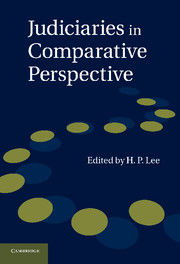Book contents
- Frontmatter
- Contents
- Contributors
- Foreword
- Preface
- Table of cases
- Table of statutes
- Part I
- Part II
- Part III
- 8 Judges’ freedom of speech
- 9 Judges and free speech in Canada
- 10 Judges and free speech in New Zealand
- 11 The judiciary and freedom of speech in South Africa
- 12 Judges and free speech in the United Kingdom
- 13 The criticism and speech of judges in the United States
- Part IV
- Part V
- Part VI
- Index
- References
10 - Judges and free speech in New Zealand
from Part III
Published online by Cambridge University Press: 07 September 2011
- Frontmatter
- Contents
- Contributors
- Foreword
- Preface
- Table of cases
- Table of statutes
- Part I
- Part II
- Part III
- 8 Judges’ freedom of speech
- 9 Judges and free speech in Canada
- 10 Judges and free speech in New Zealand
- 11 The judiciary and freedom of speech in South Africa
- 12 Judges and free speech in the United Kingdom
- 13 The criticism and speech of judges in the United States
- Part IV
- Part V
- Part VI
- Index
- References
Summary
Lord Atkin once memorably remarked that ‘Justice is not a cloistered virtue; she must be allowed to suffer the scrutiny and respectful even though outspoken comments of ordinary men.’ His Lordship had in contemplation, in a contempt case, a bipartite problem: those who administer the law, and with the cloak of the protections afforded that role, may, and must where necessary and appropriate, make strong comment in the course of determining a controversy. And persons outside the circle of those administering justice are entitled to make ‘respectful’ but just as outspoken comment or replies about the ‘public act done in the seat of justice’. Those propositions are not in doubt.
The question the equation as thus stated does not answer is, what is the position of a judge who feels impelled to make some observations as to what is happening within the justice system itself, or some particular aspect of it, outside of the formal confines of a given case or judgment? Should the judge confine his or her observations purely to the discharge of particular judicial obligations in that given case? If not, under what circumstances is it permissible and appropriate for an individual judge to offer particular commentary of a more general character?
- Type
- Chapter
- Information
- Judiciaries in Comparative Perspective , pp. 195 - 216Publisher: Cambridge University PressPrint publication year: 2011
References
- 3
- Cited by



